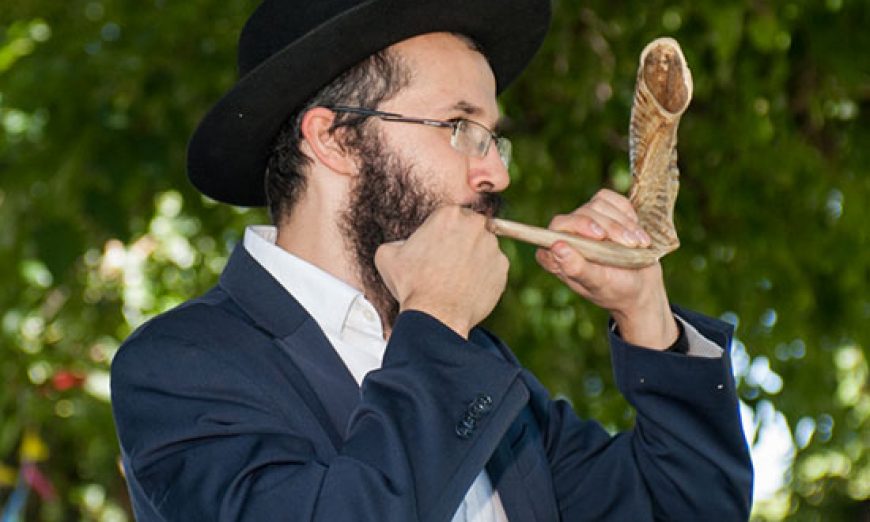Last week Santa Clarans near Chabad Santa Clara Jewish Center on Warburton heard something that until last year was never heard—to anyone’s knowledge—in the boundaries of the City of Santa Clara: The sound of the Shofar, the rams horn, announcing the start of Rosh Hashanah, the Jewish New Year, on Sept. 20 and 21.
Chabad Santa Clara (jewishclara.com) is slightly over a year old and is led by Rabbi Yigal Rosenberg and his wife Rebbitzin Elana Rosenberg. It’s been an eventful year for the growing congregation, with regular Shabbat dinners, holiday services, Torah and religion studies, and Santa Clara’s first public menorah lighting.
Last May Chabad celebrated the installation of a traditional handwritten, parchment scroll of the Torah that is used in Jewish ceremonies. The Torah—personally carried from New York by a member of the congregation—was escorted to the center with a parade of music and dancing; a tradition that goes back to King David, who welcomed the Ark of Covenant into Jerusalem with dancing and music.
As the beginning of the lunar year, Rosh Hashanah also is a liturgical celebration of the beginning of all time, the creation, in which we are called to active rededication of ourselves, said Rabbi Yigal.
During Rosh Hashanah, sweet foods like apples dipped in honey and pomegranates are eaten to symbolize a sweet and abundant year ahead. The traditional Shabbat bread, challah, is made in a circle, instead of a braid, for Rosh Hashanah, to symbolize the eternal cycle of life.
To get into the sweet spirit Chabad held a honeybee workshop on Sept. 17 at Machado Park with local bee-keeper Mike Stang, who brought hives to show the bees at work and provide a honey-tasting.
Wednesday evening at sunset, after a prayer service that included the cantorial virtuosity of Steve Lackner—Rosh Hashanah includes some of the most beautiful chants and melodies of traditional Jewish sacred music—more than 80 people sat down to a convivial dinner at the Chabad house.
On Sept. 29 Chabad will hold the Kol Nidrei and Yom Kippur evening service at 6:30 p.m., Yizkor memorial service on Saturday at 9 a.m., and closing Neilah services followed by a bagel “break-fast” at 7:30 p.m.
Chabad will also host a community celebration of Sukkot on Oct. 8. The seven-day holiday remembers the Jews’ 40 years sojourn in the wilderness, and is celebrated in temporary outdoor structures called sukkah.
Those who can’t get to Chabad House’s sukkah can call Sukkah on Wheels, a “sukkah truck” to bring the holiday to them. There will also be a kosher food tasting at Santa Clara Square Whole Foods on Oct. 8.
Chabad is a branch of Hasidic Orthodox Judaism, getting its name from the Hebrew words for wisdom, understanding, and knowledge. Hasidism—“piety”—was an 18th century Eastern European grassroots religious revival that stressed joyful worship, divine immanence, mysticism and inner spirituality. Music and dance are central to Hasidic celebrations.
Following the teachings of Rabbi Menachem Mendel Schneerson (1902–1994), The Rebbe, Chabad actively engages with the community—“turning up the light”—and supports a worldwide network of social and humanitarian services, as well as primary and secondary schools and religious centers for all Jews, regardless of affiliation or personal religious observance.
For Hasidic Jews, there is no separation of the sacred and the secular. All of life has sacramental meaning and faith is a continuous and active response to the divine.
For example, the shofar is not only a traditional ritual at the start of the New Year, it is also “God’s call to us to elevate the world, to bring purpose and meaning to society,” Rabbi Yigal explained. “But God waits for us to blow the shofar to re-accept for ourselves the mission that He has for us.”
Rebbitzin Elena likens the call of the shofar to the cry of a baby. “In the journey of life the soul gets covered up,” she says. “The shofar brings us back to the essential soul, and HaShem* hears our cry like a baby’s cry—the cry of a child is never ignored.”
Chabad Santa Clara is at 2078 Warburton Ave. You can find information about High Holiday and other services at jewishclara.com/events/partner/highholidays, by emailing rabbi@jewishsantaclara.com, or calling 408-982-7417.
*HaShem—literally, “the name”—is the Hebrew word that is sometimes used to speak of God in ordinary conversation.






